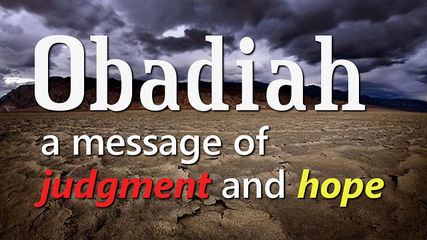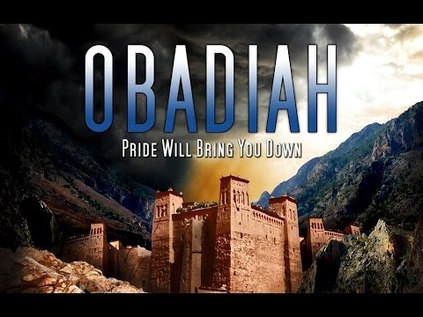 Photo credit: Creative Commons - The Scriptures
Photo credit: Creative Commons - The Scriptures
The English word prophet in the Old Testament comes from the Hebrew word “nabiy” which means “spokesman” or “speaker”. The Greek word for prophet is “prophētēs”, which can mean “one who speaks forth” or “advocate.” Prophets are also called “seers,” because of their spiritual insight or their ability to “see” the future, as directed by God.
Obadiah
Obadiah, whose name means“worshipper of Yahweh”, prophesied judgement on Edom, Judah’s neighbor to the southeast. The Edomites were decendenta of Jacob's twin brother Edom.
Genesis 25:29-30 NIV Once when Jacob was cooking some stew, Esau came in from the open country, famished. He said to Jacob, “Quick, let me have some of that red stew! I’m famished!” (That is why he was also called Edom. )
Obadiah, who prophesied judgement on Edom, Nahum who prophesied against Assyria, and Habakkuk against Babylon, is one of three who prophesied against countries that and afflicted Israel and Judah throughout their histories.
The prophetic book Obadiah is the shortest book of the Old Testament. There is no information in the book about the man Obadiah, his family, where he lived, or where he was from. Because of his emphasis on Jerusalem, throughout this prophecy of judgment on Edom, it's not a big stretch to presume that Obadiah came from somewhere near Judah's capital.
Many scholars believe that the book of Obadiah the earliest written book of prophecy, perhaps as early as the 840s BC. In the 840s BC. Edom rebelled against Judah.
2 Kings 8:20-22 NIV In the time of Jehoram, Edom rebelled against Judah and set up its own king. So Jehoram went to Zair with all his chariots. The Edomites surrounded him and his chariot commanders, but he rose up and broke through by night; his army, however, fled back home. To this day Edom has been in rebellion against Judah. Libnah revolted at the same time.
Obadiah 1:10-14 NIV Because of the violence against your brother Jacob, you will be covered with shame; you will be destroyed forever. On the day you stood aloof while strangers carried off his wealth and foreigners entered his gates and cast lots for Jerusalem, you were like one of them. You should not gloat over your brother in the day of his misfortune, nor rejoice over the people of Judah in the day of their destruction, nor boast so much in the day of their trouble. You should not march through the gates of my people in the day of their disaster, nor gloat over them in their calamity in the day of their disaster, nor seize their wealth in the day of their disaster. You should not wait at the crossroads to cut down their fugitives, nor hand over their survivors in the day of their trouble.
This passage indicates an invasion of Judah by Edom. Edom was not strong enough to invade Judah is. It's own so it’s believed that their invasion was as an ally of other stronger nations. The behavior of the Edomites described in this passage indicates that they waited to attack and kill the people as they fled from the Philistines and Arabians who had invaded Jerusalem.
2 Chronicles 21:16-17 NIV The Lord aroused against Jehoram the hostility of the Philistines and of the Arabs who lived near the Cushites. They attacked Judah, invaded it and carried off all the goods found in the king’s palace, together with his sons and wives. Not a son was left to him except Ahaziah, the youngest.
The Edomites could have easily heard of Jerusalem’s invasion by foreign powers and entered themselves into the fray so that they too might benefit from plundering their neighbors in Jerusalem.
 Photo credit: Creative Commons - End of the Matter
Photo credit: Creative Commons - End of the Matter
Why Is Obadiah Important
Obadiah uses the name and title “Lord God” to stress God’s sovereign power over the nations. He will not stand ipby and let His people suffer forever.
Obadiah 1:1 NIV The vision of Obadiah. This is what the Sovereign Lord says about Edom— We have heard a message from the Lord : An envoy was sent to the nations to say, “Rise, let us go against her for battle”--
Through Obadiah, God reminded Edom of their poor treatment of His people;
Obadiah 1:12-14 NIV You should not gloat over your brother in the day of his misfortune, nor rejoice over the people of Judah in the day of their destruction, nor boast so much in the day of their trouble. You should not march through the gates of my people in the day of their disaster, nor gloat over them in their calamity in the day of their disaster, nor seize their wealth in the day of their disaster. You should not wait at the crossroads to cut down their fugitives, nor hand over their survivors in the day of their trouble.
God promises redemption, not to the Edomites but to the people of Judah.
Obadiah 1:17-18 NIV But on Mount Zion will be deliverance; it will be holy, and Jacob will possess his inheritance. Jacob will be a fire and Joseph a flame; Esau will be stubble, and they will set him on fire and destroy him. There will be no survivors from Esau.” The Lord has spoken.
The nation of Edom eventually disappeared into history.
Obadiah’s prophecy focuses on the destructive power of pride. It reminds us of the consequences of living in a self-serving manner, of following through on our own feelings and desires without considering their impact on those around us.
Proverbs 16:18-19 NIV Pride goes before destruction, a haughty spirit before a fall. Better to be lowly in spirit along with the oppressed than to share plunder with the proud.
Though such pride has been part of the lives of fallen human beings since the tragedy of the fall in Eden, Obadiah offers us a stark reminder to place ourselves under God’s authority, to subject our appetites to His purposes, and to find our hope in being His people when the restoration of all things comes.

 RSS Feed
RSS Feed